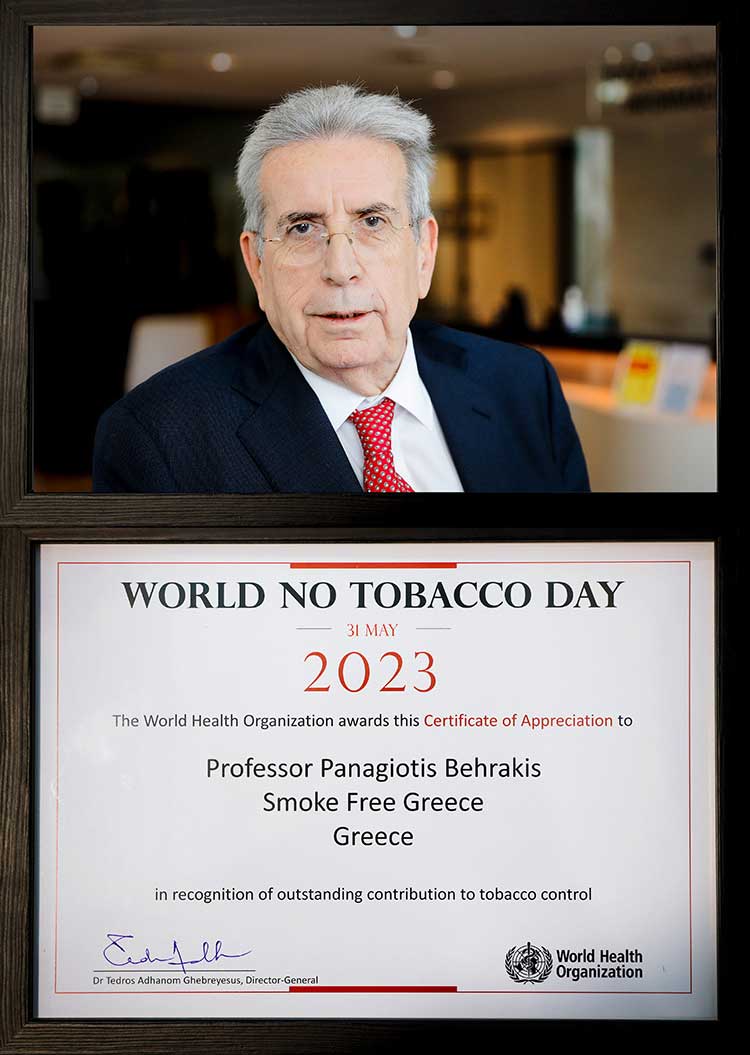August 25, 2023 | VOLUME 1, ISSUE 2
In celebration of World No Tobacco Day (May 31), the World Health Organization (WHO) annually recognizes individuals or organizations from each of the six WHO regions for their accomplishments in the area of tobacco control.
Panagiotis Behrakis, MD, PhD, FCCP, a former CHEST Board of Regents member, was named a 2023 esteemed recipient for his Smoke Free Greece program, a global antismoking movement. CHEST Advocates contacted Dr. Behrakis to recognize his efforts and highlight a career dedicated to smoking prevention and cessation.

The World Health Organization recognized Dr. Panagiotis Behrakis for his decades of advocacy work.
Dr. Behrakis is now a retired pulmonologist who remains an active member of the European Respiratory Society and serves as the point person for the WHO for tobacco control in Greece.
His commitment to tobacco control began in 1987 when he returned from working in Canada to his home country of Greece. According to Dr. Behrakis, tobacco smoke was everywhere in Greece. The country ranked first in tobacco consumption per capita worldwide at that time. “You could not go anywhere without breathing or smelling tobacco cigarettes,” Dr. Behrakis said. “That somehow made me crazy, and I found it necessary to act.”
Greece and tobacco
Globally, Greece continues to have alarmingly high statistics in tobacco use and prevalence.
Less than a decade ago, the United States reported cigarette user prevalence under 20%. At the same time, the Hellenic Statistical Authority (ELSTAT) reported that 39% of Greek men and 26% of Greek women (15 years old or older) smoked daily, while 27% of young adolescents (15 to 24 years old) smoked daily or occasionally.
In 2011, Harvard School of Public Health published “The Greek Tobacco Epidemic,” which outlined that…
- One in four students aged 13 to 15 started smoking before age 10.
- An estimated 19,000 smoking-related deaths occured in Greece each year.
- Tobacco-attributable disease accounted for nearly 15% of all health care spending in Greece.
According to the WHO, the smoking population in Greece steadily increased from 2000 to 2009. Other European countries saw a decline in the smoking trend, with average consumption dropping from 3,055 cigarettes per capita for the year in 2008 to 2,942 per capita in 2009.
In 2010, Greece passed new policies, including clean air laws and excise tax increases. Cigarette consumption then fell to 2,458 cigarettes per capita for the year, with 27.7 billion total cigarettes consumed by the Greek population.
But the numbers remained concerning. It was going to take more than a few new laws to change lifelong habits.
A threat to human rights
Exposure to secondhand smoke both at home and public places—including school grounds, where the smoke-free legislation was poorly enforced—remained a concern. Individuals who chose not to smoke or stopped smoking were still constantly exposed to the toxins.
Dr. Behrakis stressed that passive smoking/secondhand smoke violates human rights beyond a public health concern. The rights of children, women, and working people were being denied.
“The concept of passive smoking as a human rights violation was first presented to me by a student who supported my organization,” Dr. Behrakis said. “The student shared a thoughtfully worded petition that 10,000 students signed in 1 week.”
From the petition:
Passive smoking in closed public spaces is a widespread form of violence, oriented mainly against small children and weak population groups, such as those suffering from lung or heart problems…we, as academic citizens of this country, take a decisive stand and ask from the European Commission and the European Network for Smoking and Tobacco Prevention (ENSP) to act in all directions in order to highlight and to recognize officially that passive smoking is a major international issue, which violates the human rights of health, work and the protection of women and children.
“This petition was particularly impactful knowing, as a pulmonologist, that if a child is exposed in the first years of his or her life to passive smoking, they will live the rest of their life with limited respiratory ability,” Dr. Behrakis said. “It is a critical issue and is something that needs to be taken seriously.”
A two-pronged approach
Encouraged by the passions of this student, Dr. Behrakis launched Smoke Free Greece, which aims to support cessation among Greek people who smoke and dissuade young Greeks from starting to smoke.
To illustrate the importance of the two-pronged approach, Behrakis uses a model called the Runny Tap model. It shows how the prevalence of smoking is wholly unaffected if education efforts focus only on cessation.